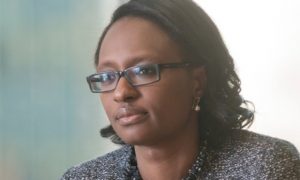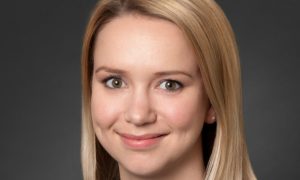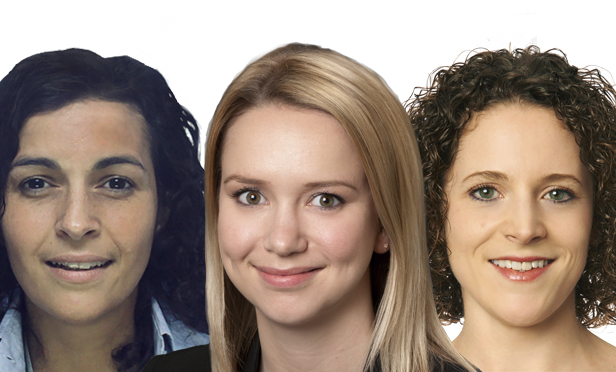Female associates on frank feedback and the mentors spurring their careers forward
Up-and-coming female lawyers at firms including Freshfields, Linklaters and CC on the partners pushing them on to success, and what law firms could be doing better on diversity
March 09, 2018 at 06:19 AM
12 minute read
To coincide with International Women's Day, Legal Week has spoken to lawyers from a range of top firms about the role that mentors – both male and female – are playing in supporting and developing talented women in law.
Mentors can be an invaluable source of support for up-and-coming lawyers, and especially so for women faced with challenges unique to their gender.
Here, associates from six top firms discuss how their mentors have contributed to their careers and offer their take on what firms should be doing to move the needle on gender diversity.
Ruby Hamid, senior associate, disputes, Freshfields Bruckhaus Deringer
Mentor: Ali Sallaway, City corporate crime partner and co-head of the global investigations practice in London
What have you learnt from your mentor? My mentor has been integral to my transition from the Bar to life at Freshfields [Hamid spent 13 years at the independent Bar before joining Freshfields in 2015]. She has taught me how to navigate professional life in a global law firm and helped me to better identify and understand what matters to clients. She points me towards opportunities to work with new people, to have exposure to the right types of work and to build relationships with clients.
What are the key challenges to making the relationship work effectively? One of the key features of our relationship is sharing timely, direct and effective feedback, combined with a discussion about how I can improve. Our relationship is based on straight talking – Ali will be frank with me and expects the same in return. Receiving constructive feedback is not always easy, but I have learned to appreciate the value of it.
What advice do you have for others considering mentorship? Think carefully about someone whose practice or whose approach to work you respect. Look for someone who has the ability to make a difference and will fight your corner. Don't limit yourself to a single mentor. Seek a fresh perspective from those outside your current place of work, as well as those within your firm, but in a different practice area or department.
What has been a career-defining moment for you? A turning point in my career was deciding to develop my practice in financial and corporate crime, and to proactively seek out opportunities in this area. Understanding the market – and the future development of enforcement in my area – was an important eye-opener for me. It led to making the move to Freshfields, which has been the start of a new chapter in my legal career.
What else would you like to see law firms do to improve gender equality in the workplace? Agile working is vital for accommodating – and supporting – the commitments employees have outside their working life. It can be a particularly powerful tool to assist women and is underused by law firms compared with other industries. I would like to see law firms better appreciate that their clients increasingly expect and are entitled to be represented by a diverse legal team. There is a commercial rationale for gender equality in law firms, which can be overlooked. Finally, gender equality is not women's problem. The key to progress is engaging the majority of leaders in law firms in effecting the changes the industry needs.
 Ula Cartwright-Finch, managing associate, disputes, Linklaters
Ula Cartwright-Finch, managing associate, disputes, Linklaters
Mentor: Matthew Weiniger QC, global co-head of international arbitration
What have you learnt from your mentor? Matthew's superpower is his advocacy, so I have been learning the art from him over the last few years. He also encouraged me to travel to Mexico shortly after we joined Linklaters to deliver a workshop on LCIA arbitration – in Spanish – with colleagues from New York and Paris. He had faith in me that I could do it and he knew it would be a great opportunity for me to shine in front of key clients.
What are the key challenges to making the relationship work effectively? Two important things to learn are recognising when you've hit a roadblock and it's time to reach out, and that it's OK to be frank about the way you feel. There are always obstacles in life; a good mentor will help you through them.
Imagine how quickly we would see results if firms introduced financial penalties for decision-makers responsible for missing diversity targets
What advice do you have for others considering mentorship? You can't force a mentor-mentee relationship; more often it arises naturally as a result of working closely with one another. But three things I would look for are (1) someone who is a superstar in the field you want to work in; (2) someone you like, respect and trust; and (3) someone who has a strong reputation for nurturing and developing their people.
What has been a career-defining moment for you? Opting for Hong Kong over London for the formative years of my professional career. As a junior lawyer, the exposure I had to responsibility, business development and cultural experience was just incredible. And it was serious fun. At the end of my NQ year, I had to stand in to deliver a talk on bilateral investment treaties on stage in front of several hundred in-house counsel from across Asia-Pacific – with only three hours' notice.
What else would you like to see law firms do to improve gender equality in the workplace? First, motivating existing leaders more powerfully to bring about change. Fear of loss is far stronger than the desire for gain, so imagine how quickly we would see results if law firms introduced financial penalties for the decision-makers responsible for missing diversity targets. Second, I would overhaul parental benefits so that all partners regardless of gender are entitled to the same leave and flexibility as employees. I would also like to see strong take-up of those policies by male partners, including the senior ones.
 Chinwe Odimba-Chapman, senior associate, employment, Clifford Chance
Chinwe Odimba-Chapman, senior associate, employment, Clifford Chance
Mentor: Employment partner Alistair Woodland
What have you learnt from your mentor? Alistair has taught me it is important to take intelligent risks with my career, to stand out from the crowd and most importantly, how to be business-focused.
What are the key challenges to making the relationship work effectively? Full transparency and dialogue – you can only get the best out of a mentor if they fully understand your strengths, weaknesses and ambitions.
What advice do you have for others considering mentorship? For women specifically, I would caution against trying to identify one single individual as a mentor. In addition, your mentor does not have to be a woman. I have been mentored and sponsored by all three partners in my team throughout my career – I like to think I have taken the best bits from each of them. The head of my team is a born leader who has helped me nurture my leadership skills; another partner demonstrates incredible empathy, which has helped me strengthen my relationship-building skills; and another partner, who has now retired, taught me to be robust and resilient.
What has been a career-defining moment for you? Being recognised for my diversity efforts in the EMpower Future Leaders Listing. The BAME Network at Clifford Chance has gained significant momentum as a result of this. We are making visible progress.
What else would you like to see law firms do to improve gender equality in the workplace? Flexible working will only be fully embraced by law firms once it becomes the norm for both men and women. Law firms should also consider return-to-work programmes (similar to the banks and consultancy firms) if they truly want to retain and senior talented women.
 Rebecca Campbell, senior associate, real estate litigation, Berwin Leighton Paisner
Rebecca Campbell, senior associate, real estate litigation, Berwin Leighton Paisner
Mentor: Disputes partner Akhil Markanday
What have you learnt from your mentor? Akhil is a fantastic listener and always keeps calm under pressure. These are two key skills that I try to emulate when working in stressful situations, which is a day-to-day part of being a litigation lawyer. He also put my name forward to take a lead role on a key client account, which helped me build my network and raise my profile within the firm.
What are the key challenges to making the relationship work effectively? A common trap is to have an expectation that your mentor will only tell you what you want to hear. You will get the most out of the relationship if you are willing to step outside of your comfort zone and learn something new about yourself.
You will get the most out of the relationship if you are willing to step outside of your comfort zone
What advice do you have for others considering mentorship? Mentoring does not have to be formal or structured to be beneficial. There will be colleagues that you work with on a daily basis who could be excellent mentors. Do not wait for a mentor to find you – seek them out.
What has been a career-defining moment for you? Being told by my head of sixth form that applying to Oxford University was "unrealistic and a waste of an application" and that I should set my sights lower. I still remember the look of shock of his face when I was offered a place to read law at Oxford. Even though it happened several years before I became a lawyer, it still defines how I approach my career. I never let anyone moderate or undermine my goals and aspirations.
What else would you like to see law firms do to improve gender equality in the workplace? Make flexible working the norm for all lawyers, rather than just making exceptions for those who have a 'business case'. BLP have invested in the technology to enable all lawyers across the firm to work from home and more flexibly, and it has been embraced from the top down. This has broken down the perception that only women with families need to work flexibly.
 Isabel Ost, senior associate, data and information technology, Clyde & Co
Isabel Ost, senior associate, data and information technology, Clyde & Co
Mentors: Commercial projects partner Nick Purnell and insurance partner Mark Williamson
What have you learnt from your mentor? My mentors have each influenced my career and the way in which I work in very different ways. Nick has been instrumental in supporting the enthusiasm that I have in my specialism and in the clients and the projects that I work on. Mark has been incredibly supportive of the practice area that I am trying to develop and of my business development skills. Both my mentors regard me as a person as opposed to treating me in a particular way because of my gender.
What are the key challenges to making the relationship work effectively? Trust. As a working parent (and both my mentors and I are working parents) it is not necessarily important where people are, but it is important that we provide a great service to our clients and also make time for our priorities outside of work. Those outside interests are important in developing well rounded individuals and professionals.
What has been a career-defining moment for you? A few years ago I was asked to speak on a panel at a seminar in the US, at an aviation conference where clients and partners were in attendance. I was by far the youngest person on that panel. The panel consisted of three GCs and a female partner of a US law firm. It was a defining moment with respect to the trust that was put in me to hold my own and the fact that the female partner – from a rival firm – was incredibly supportive. Her behaviour was a great example to me of the integrity that you should show in your relationships with your peers.
What else would you like to see law firms do to improve gender equality in the workplace? Understand and embrace peoples' differences, whether they're male or female.
 Rebecca Holden, senior associate, corporate, DLA Piper
Rebecca Holden, senior associate, corporate, DLA Piper
Mentor: Andrew Davies, partner and location head for the Leeds corporate group
What have you learnt from your mentor? One of the best pieces of advice is that I don't have to be Superwoman. Returning from maternity leave in 2017 came with its challenges, but Andrew's support helped me to become more focused and get more out of home life and career. Andrew has also been of enormous help in boosting my confidence, not just in the advice he has given but also through advocating me to colleagues and clients.
What are the key challenges to making the relationship work effectively? Choosing the right mentor is crucial. It has to be someone you identify with and who has achieved what you would like to achieve. Too often, mentoring schemes make arbitrary matches that aren't based on real parallels in terms of outlook or personality.
What has been a career-defining moment for you? Leading an all-parties negotiation in a packed boardroom in Rome. Going solo on such a grand scale made me realise I could definitely do the job.
What else would you like to see law firms do to improve gender equality in the workplace? Women in general need more positive role models in the workplace. If women see women succeeding in senior positions, it will become a self-fulfilling prophecy and we might start to see more parity at the top.
This content has been archived. It is available through our partners, LexisNexis® and Bloomberg Law.
To view this content, please continue to their sites.
Not a Lexis Subscriber?
Subscribe Now
Not a Bloomberg Law Subscriber?
Subscribe Now
NOT FOR REPRINT
© 2025 ALM Global, LLC, All Rights Reserved. Request academic re-use from www.copyright.com. All other uses, submit a request to [email protected]. For more information visit Asset & Logo Licensing.
You Might Like
View All


Fidal Launches Disputes Practice; Pinsent’s Paris Arbitration Partner Jumps to Boutique Firm, Plus Other French Moves
5 minute read
Top Labor Lawyer and Former Germany Managing Partner Leaves A&O Shearman to Found Boutique Firm
3 minute readTrending Stories
- 1Starbucks Sues Ex-Executive to Recover $1M Signing Bonus
- 2Navigating AI Risks: Best Practices for Compliance and Security
- 320 New Judges? Connecticut Could Get Wave of Jurists
- 4Orrick Loses 10-Lawyer Team to Herbert Smith in Germany
- 5‘The US Market Is Critical’: KPMG’s Former Head of Global Legal Services On the Legal Arm of the Big Four Firm Entering the US
Who Got The Work
J. Brugh Lower of Gibbons has entered an appearance for industrial equipment supplier Devco Corporation in a pending trademark infringement lawsuit. The suit, accusing the defendant of selling knock-off Graco products, was filed Dec. 18 in New Jersey District Court by Rivkin Radler on behalf of Graco Inc. and Graco Minnesota. The case, assigned to U.S. District Judge Zahid N. Quraishi, is 3:24-cv-11294, Graco Inc. et al v. Devco Corporation.
Who Got The Work
Rebecca Maller-Stein and Kent A. Yalowitz of Arnold & Porter Kaye Scholer have entered their appearances for Hanaco Venture Capital and its executives, Lior Prosor and David Frankel, in a pending securities lawsuit. The action, filed on Dec. 24 in New York Southern District Court by Zell, Aron & Co. on behalf of Goldeneye Advisors, accuses the defendants of negligently and fraudulently managing the plaintiff's $1 million investment. The case, assigned to U.S. District Judge Vernon S. Broderick, is 1:24-cv-09918, Goldeneye Advisors, LLC v. Hanaco Venture Capital, Ltd. et al.
Who Got The Work
Attorneys from A&O Shearman has stepped in as defense counsel for Toronto-Dominion Bank and other defendants in a pending securities class action. The suit, filed Dec. 11 in New York Southern District Court by Bleichmar Fonti & Auld, accuses the defendants of concealing the bank's 'pervasive' deficiencies in regards to its compliance with the Bank Secrecy Act and the quality of its anti-money laundering controls. The case, assigned to U.S. District Judge Arun Subramanian, is 1:24-cv-09445, Gonzalez v. The Toronto-Dominion Bank et al.
Who Got The Work
Crown Castle International, a Pennsylvania company providing shared communications infrastructure, has turned to Luke D. Wolf of Gordon Rees Scully Mansukhani to fend off a pending breach-of-contract lawsuit. The court action, filed Nov. 25 in Michigan Eastern District Court by Hooper Hathaway PC on behalf of The Town Residences LLC, accuses Crown Castle of failing to transfer approximately $30,000 in utility payments from T-Mobile in breach of a roof-top lease and assignment agreement. The case, assigned to U.S. District Judge Susan K. Declercq, is 2:24-cv-13131, The Town Residences LLC v. T-Mobile US, Inc. et al.
Who Got The Work
Wilfred P. Coronato and Daniel M. Schwartz of McCarter & English have stepped in as defense counsel to Electrolux Home Products Inc. in a pending product liability lawsuit. The court action, filed Nov. 26 in New York Eastern District Court by Poulos Lopiccolo PC and Nagel Rice LLP on behalf of David Stern, alleges that the defendant's refrigerators’ drawers and shelving repeatedly break and fall apart within months after purchase. The case, assigned to U.S. District Judge Joan M. Azrack, is 2:24-cv-08204, Stern v. Electrolux Home Products, Inc.
Featured Firms
Law Offices of Gary Martin Hays & Associates, P.C.
(470) 294-1674
Law Offices of Mark E. Salomone
(857) 444-6468
Smith & Hassler
(713) 739-1250










